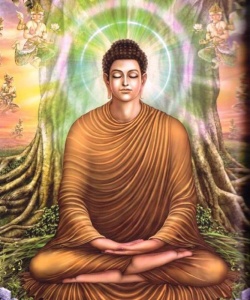Difference between revisions of "The Dharma Realm of People"
| Line 8: | Line 8: | ||
The [[realm of asuras]] is [[dangerous]], but what about the [[realm]] of [[people]]? There are both good and [[evil]] [[people]]. The way of men is [[harmony]]. [[People]] are harmonious [[beings]] who are capable of getting along with anyone. | The [[realm of asuras]] is [[dangerous]], but what about the [[realm]] of [[people]]? There are both good and [[evil]] [[people]]. The way of men is [[harmony]]. [[People]] are harmonious [[beings]] who are capable of getting along with anyone. | ||
| − | However, those who become [[human beings]] are neither completely good nor completely bad. [[Beings]] who are completely good are [[reborn]] in the [[heavens]], while those who are thoroughly bad become [[animals]] or [[hungry ghosts]] or fall into the [[hells]]. [[People]] have both [[merit]] and offenses. When a person's [[merit]] is [[greater]] than his offenses, he will be born into a rich and {{Wiki|distinguished}} family, but one with small [[merit]] and heavy offenses will be born into a poor family. Between these [[extremes]] are a thousand differences and a {{Wiki|myriad}} {{Wiki|distinctions}}. Therefore, the verse says: With [[merit]] and error interspersed. They have some [[merit]], and they also have some offenses; they are neither extremely [[yin]] nor extremely [[yang]]. [[Beings]] with a preponderance of [[yin]] become [[ghosts]]. Those who are mostly [[yang]] become [[gods]]; they don't become [[humans]]. | + | However, those who become [[human beings]] are neither completely good nor completely bad. [[Beings]] who are completely good are [[reborn]] in the [[heavens]], while those who are thoroughly bad become [[animals]] or [[hungry ghosts]] or fall into the [[hells]]. [[People]] have both [[merit]] and offenses. When a person's [[merit]] is [[greater]] than his offenses, he will be born into a rich and {{Wiki|distinguished}} [[family]], but one with small [[merit]] and heavy offenses will be born into a poor [[family]]. Between these [[extremes]] are a thousand differences and a {{Wiki|myriad}} {{Wiki|distinctions}}. Therefore, the verse says: With [[merit]] and error interspersed. They have some [[merit]], and they also have some offenses; they are neither extremely [[yin]] nor extremely [[yang]]. [[Beings]] with a preponderance of [[yin]] become [[ghosts]]. Those who are mostly [[yang]] become [[gods]]; they don't become [[humans]]. |
[[Human beings]] can ascend to the [[heavens]] or fall into the [[hells]]. If you do [[good deeds]], you ascend; if you commit offenses, you fall. So the verse says: On [[virtuous]] [[deeds]] you rise; offenses make you fall. | [[Human beings]] can ascend to the [[heavens]] or fall into the [[hells]]. If you do [[good deeds]], you ascend; if you commit offenses, you fall. So the verse says: On [[virtuous]] [[deeds]] you rise; offenses make you fall. | ||
Latest revision as of 05:10, 21 September 2015
The way of men is harmony,
With merit and error interspersed.
On virtuous deeds you rise; offenses make you fall.
It has nothing to do with anyone else at all.
The realm of asuras is dangerous, but what about the realm of people? There are both good and evil people. The way of men is harmony. People are harmonious beings who are capable of getting along with anyone.
However, those who become human beings are neither completely good nor completely bad. Beings who are completely good are reborn in the heavens, while those who are thoroughly bad become animals or hungry ghosts or fall into the hells. People have both merit and offenses. When a person's merit is greater than his offenses, he will be born into a rich and distinguished family, but one with small merit and heavy offenses will be born into a poor family. Between these extremes are a thousand differences and a myriad distinctions. Therefore, the verse says: With merit and error interspersed. They have some merit, and they also have some offenses; they are neither extremely yin nor extremely yang. Beings with a preponderance of yin become ghosts. Those who are mostly yang become gods; they don't become humans.
Human beings can ascend to the heavens or fall into the hells. If you do good deeds, you ascend; if you commit offenses, you fall. So the verse says: On virtuous deeds you rise; offenses make you fall.
It has nothing to do with anyone else at all. Other people cannot tell you to fall into the hells, make you a ghost, or cause you to become an animal. It is entirely up to you. What you create you must endure. You must suffer the consequences of your own actions.
